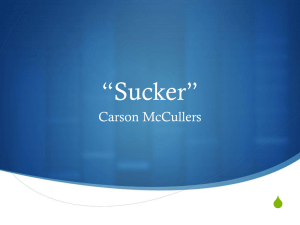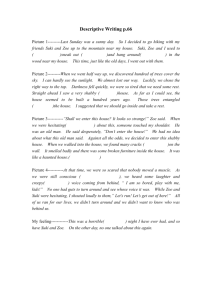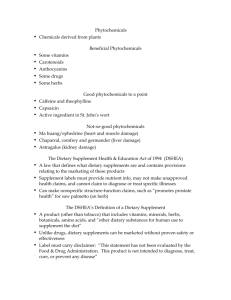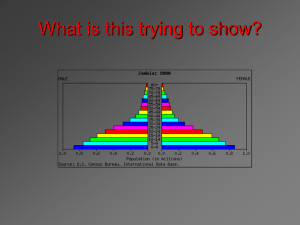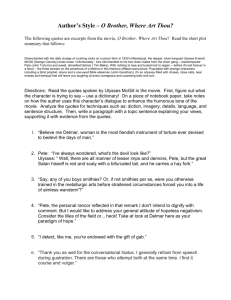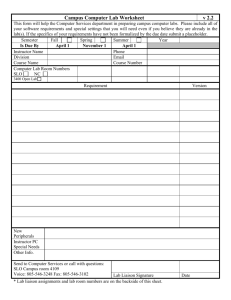monicashaw_dshea_sample
advertisement
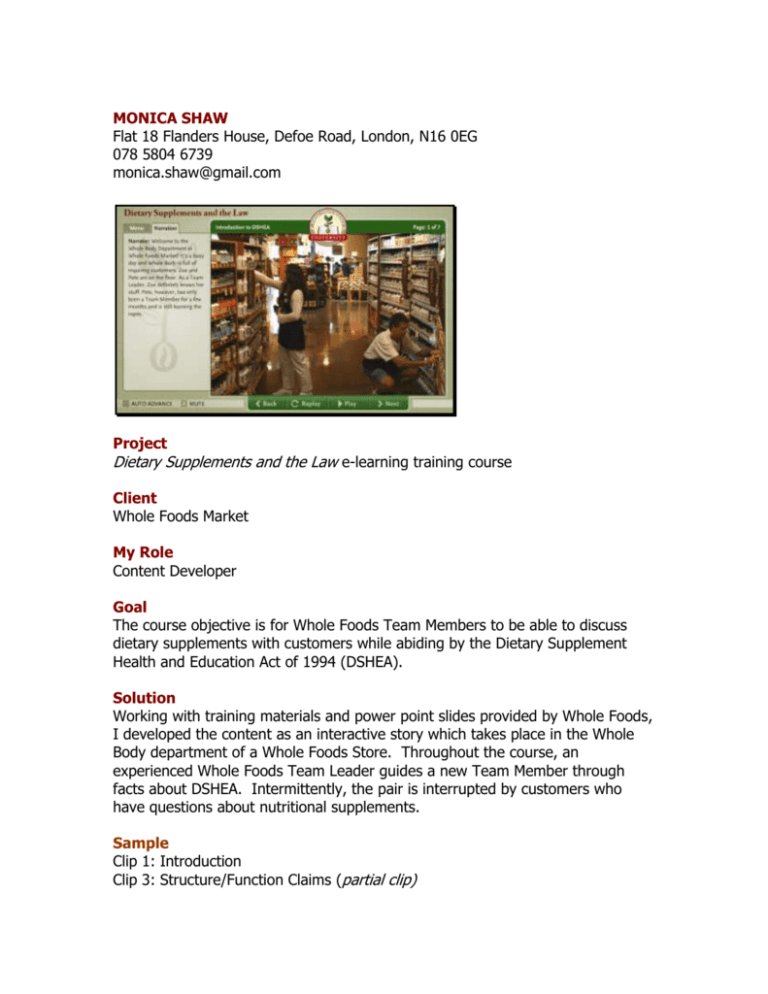
MONICA SHAW Flat 18 Flanders House, Defoe Road, London, N16 0EG 078 5804 6739 monica.shaw@gmail.com Project Dietary Supplements and the Law e-learning training course Client Whole Foods Market My Role Content Developer Goal The course objective is for Whole Foods Team Members to be able to discuss dietary supplements with customers while abiding by the Dietary Supplement Health and Education Act of 1994 (DSHEA). Solution Working with training materials and power point slides provided by Whole Foods, I developed the content as an interactive story which takes place in the Whole Body department of a Whole Foods Store. Throughout the course, an experienced Whole Foods Team Leader guides a new Team Member through facts about DSHEA. Intermittently, the pair is interrupted by customers who have questions about nutritional supplements. Sample Clip 1: Introduction Clip 3: Structure/Function Claims (partial clip) Clip 1: Introduction # Narration Multimedia 1. Narrator: Welcome to the Whole Body Department at Whole Foods Market! It's a busy day and Whole Body is full of inquiring customers. Zoe and Pete are on the floor. As a Team Leader, Zoe definitely knows her stuff. Pete, however, has only been a Team Member for a few months and is still learning the ropes. A photo montage of scenes from the Whole Body department. Images include Pete and Zoe on the floor! 2. Customer: Excuse me – I've been feeling down in the dumps lately and I'm looking for something to cure the summertime blues. Can you recommend a supplement? Photo of customer and Pete near aisle containing St. John's Wort. Pete is holding a supplement bottle. Pan from customer to Pete. Pete: Sure. I use St. John's Wort as a natural antidepressant. It really helps cure the doldrums! 3. Zoe: Hey Pete, I'm glad to see you're eager to help customers, but did you know that the advice you just gave violates federal law? Image of Zoe and Pete. Customer is walking away in the background. Pan from Zoe to Pete. Pete: I'm confused – I thought our primary objective was to satisfy our customers' needs as best we can. Wasn't I doing that by recommending an effective product? 4. Zoe: Your intentions are great, Pete. But when it comes to dietary supplements, we need to provide consumers with safe and effective products while protecting them from unsafe products and claims. The government passed a law in 1994 to do just that. It's called DSHEA, and it is the key law that regulates supplements in the United States. Close-up of products under heading, "DSHEA: Dietary Supplement Health and Education Act of 1994". 5. Zoe: It's important to follow DSHEA, not only to protect customers, but also to protect Whole Foods Market. It is the law, after all. And by following these guidelines, we are promoting the integrity of the supplement industry. Once you understand the law, you'll understand how to communicate with customers about Whole Body products. Picture of FDA warning letter. Large dollar sign is shown over the letter. Zoom out of letter to an image of Pete and Zoe. 6. Narrator: We'll follow these two Team Members as Zoe teaches Pete how to communicate with customers according to DSHEA regulations. By the time Zoe is done teaching Pete, we'll know how to define and identify dietary supplements as specified by DSHEA. We'll be able to distinguish between disease claims and allowed claims. We'll learn how to apply structure/function language to labels and how DSHEA applies to third party literature. Finally, we'll be able to effectively discuss with customers how dietary supplements support a healthy body without diagnosing or prescribing treatment. List of learning objectives. Pete and Zoe will show us how to: Identify a dietary supplement as defined by DSHEA Identify the difference between disease claims and allowed claims Define structure/function language and describe supplements according to this language Identify and apply structure/function language to labels Identify and list the criteria for third party literature Discuss with customers how dietary supplements support a healthy body without diagnosing or prescribing Clip 3: Structure/Function Claims # Narration Multimedia 1. Pete: There are so many no-no words and taboo topics in DSHEA. So what can I say to the customer? Picture of Zoe talking to Pete; Pete is looking a bit confused. Zoe: We can talk to Whole Body customers using what DSHEA calls structure/function language. 2. Zoe: We can explain how a supplement affects the biological structure and/or physical function of the body. Image from (1.) is still present but faded in the background. Definition appears in front: Structure/function language describes how a supplement affects the biological structure and/or physical function of the body. 3. 4. 5. Zoe: Biological structures are the heart, lung, brain, blood vessels, and other parts of the body. Physical functions are what those body parts control, like immune response and blood pressure. Matching Activity. Match the disease claim with the matching structure/function claim: Heart disease / Cardiovascular health Bronchitis / Supports respiratory function Cold fighter / Supports immune function Cancer cure / Supports cell integrity Anti-arthritic / Promotes healthy joints Zoe: Structure/function language describes the role of a supplement in sustaining the normal health of the body. Image of Zoe and Pete talking with text on screen. Zoe: When talking to customers, we should stay positive! Use words like "maintain," "promote," "support," "improve"… List of words are shown on screen as they are spoken. "Healthy" should be especially prominent. Structure/function language describes the role of a supplement in sustaining the normal health of the body. Pete: "Nourish," "enhance," "balance," "build," "protect"… Zoe: You know it! And don’t forget "healthy!" 6. Zoe: Remember, Pete, we're not doctors - we have to choose our words carefully. We cannot diagnose illnesses or prescribe medicine, but we can discuss with our customers how dietary supplements support the health of body systems. Photo of Zoe and Pete are shown faded behind the text. We can't diagnose or prescribe. We can discuss how dietary supplements support the health of body systems. 7. Customer: Excuse me, do you work here? Can I use any of these products to lower my cholesterol? Image of a customer talking to Pete and Zoe; she is struggling to hold a large pile of Whole Foods products. 8. Narrator: How should Zoe and Pete respond to the customer's question? Multiple Choice Question What is the correct Team Member response? (B.) A. Niacin is known for its cholesterollowering properties. B. By law, we are not allowed to discuss diseases or treatment; however, I can tell you that we offer nutrients that can help the body naturally support healthy cholesterol levels. C. Although our products are not medicines, some are known to be just as effective as drugs to lower cholesterol. Correct Feedback (appears in a pop-up window): Correct! Incorrect Feedback (appears in a pop-up window): Incorrect. This statement is a disease claim. According to DSHEA, we cannot use disease claims to describe supplements. 9. Zoe: By law, we are not allowed to discuss diseases or treatment; however, I can tell you that we offer nutrients that can help the body naturally support healthy cholesterol levels. Photo of Zoe helping the customer put her supplements into a cart.
